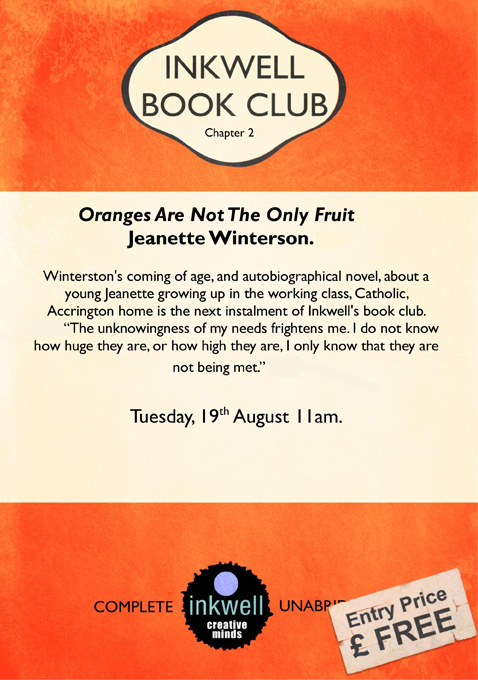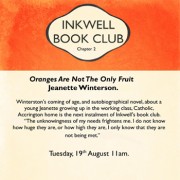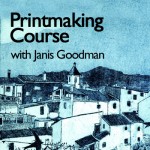Inkwell Book Club Chapter 1: The Sense of Something Happening
Inkwell’s first book club first convened over Julian Barnes’ The Sense of an Ending. This Barnes latest novel from 2011 that finally won him the ‘posh bingo’ Booker prize, a much deserved accolade.
It became apparent that TSOAE was a popular choice for the first book. It leaves plenty of unresolved questions, that still linger after second, and third readings, and indeed, long after the communal divulgence of a reading group, to a singular persistence in ones own mind. Barnes defeats you in this book: whether or not it was made to mock the reading group, our own readers were in an investigative discussion instigated by the trickery of Barnes’ narrative. The most remarkable thing about all this though, it is not a screw-ball sci-fi, or murder mystery, it is a very normal literary account of a man named Tony.
Tony Webster, retired, had a career, a marriage, and a ‘calm’ divorce. A law-abiding citizen,worked hard for a living and nothing much to make a book out of, begins remembering his past. There was his clique at school and bar the tragic suicide of Adrian at the time, the only person ‘whose life so far had contained anything novel worthy’. Where the first part of the novel charts him remembering this, the second half throws this rose-tinted nostalgia into a shattering question of the nature of truth. He has been left some money (£500) by his ex-girlfriend Veronica’s mother’s will, and two documents, one of which is Adrian’s diary, which means he has to re-establish contact with her to get hold of what he believes, is by rights his, as Veronica possesses it.
Tony is now conscripted into getting the diary back of a reluctant Veronica, and figuring out why the money he has received is termed as ‘blood money’. Adrian, who seemed on another level of philosophy and intelligence, was not just a tragic suicide (or was he?), as the possibilities of what sort of relationship he had with Veronica’s mother open up.
The novel is primarily about the nature of memory and it’s reality. Barnes gives us the warning in the first lines about the reliability of Tony
“I remember in no particular order….
- bathwater long gone cold behind a locked door.
This last isn’t something I actually saw, but what you end up remembering isn’t always the same as what you have witnessed.”
But as Barnes relies on history, and Tony and his friends are avid dilettantes of history, they come to realise that history is far from fact (“History is that certainty produced at the point where the imperfections of memory meet the inadequacies of documentation”), and indeed they witness “that was another of our fears: that Life wouldn’t turn out to be like Literature.” (Barnes’ capitals for Life and Literature).
It’s worth noting that the title originally comes from critic Frank Kermode’s work. Here Kermode claimed that humans are deeply uncomfortable with the idea that our lives form only a short period on Earth, and as such in the history of the world. We look for a coherent pattern to explain this fact, and we are always in the middle of the story. As a result we are always imposing fictions on our lives, and one can see this idea prevalent in TSOAE. However this idea is a key one here, but it also Barnes’ is making it prevalent for all novels, making a statement that this is the power of fiction and ultimately the postmodern; the fact that you book readers, you Inkwell book club are sat here discussing this book like it has happened is because of the power of narrative fiction, that I the writer constructed for you. And so when Veronica says to Tony frequently “You don’t get it, and you never will do” we have to wonder if this is really supposed to be a genuine Veronica quote, or merely Barnes using her as a prop to speak to the reader.
Of course the account I have written here is another, probably incorrect attempt to surmise the book, which is of course, what all the fun of Inkwell book club is about.

Next time we’re reading Jeanette Winterson’s (1985) Oranges Are Not The Only Fruit. Semi-autobiographical, focusing on a young Jeanette as she grows up in a Catholic, working class household in Accrington, she realises that she is not ‘normal’ as she grows up. This is also a genuinely funny book, and although it may not have the trickery of Barnes it certainly raises a lot questions about morality and belief in an increasingly secular world.
End Note
I do not wish to give any plot spoilers away for the books we read, maybe perhaps as a slight advertisement for the books, as they deserve to be bought and read. However, in doing so, I would advise not buying your books off of Amazon, and rather give your money to a high-street book store, independent or not, for the sake of the book industry.
Inkwell’s next book club is on Tuesday 19th August 11am and it is very advisable to read the book before attending.
Julian Barnes’ (2011) The Sense of An Ending (pp.150) is published by Jonathan Cape.
Jeanette Winterson’s (1985) Oranges Are Not The Only Fruit (pp.224) is published by Vintage.



